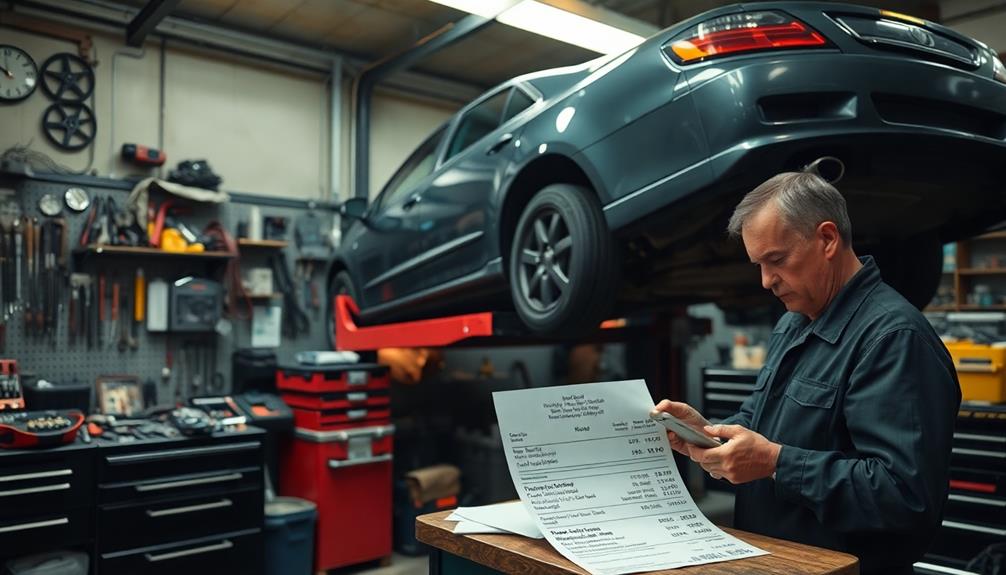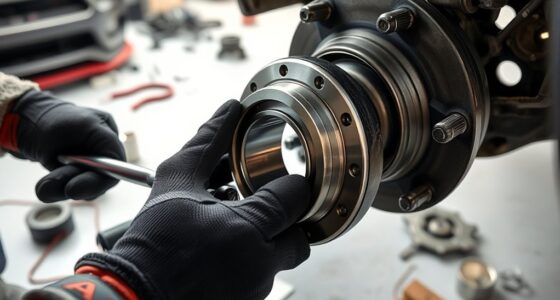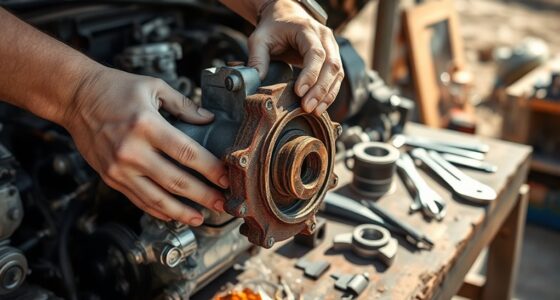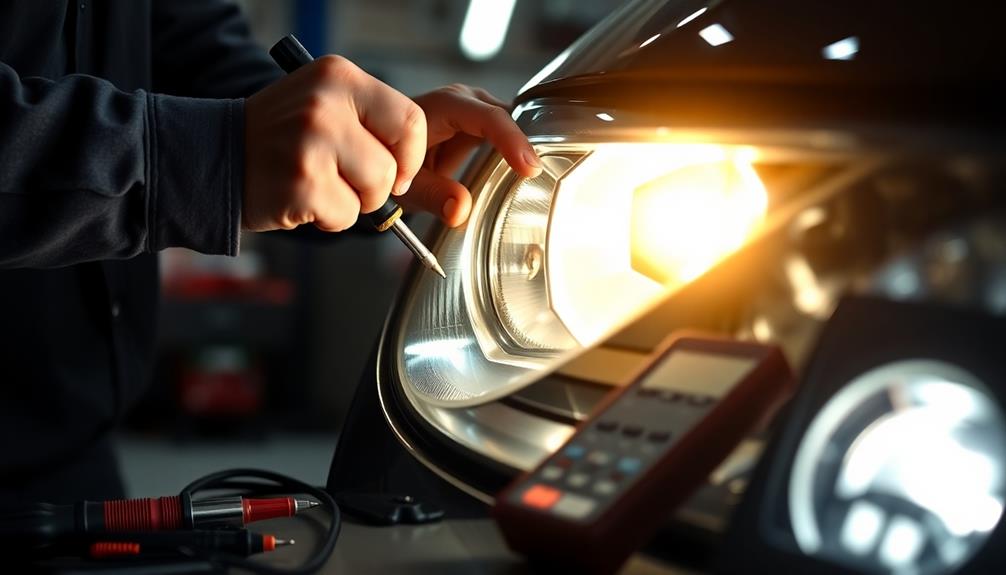To make your brakes last longer, consider adjusting your driving habits. Gradual pressure on the brake pedal and maintaining a safe following distance can greatly reduce wear and tear. Practice engine braking when going downhill, and be mindful of load management; unnecessary weight can strain your brakes. Regular inspections and using high-quality components enhance performance. Stay aware of signs like grinding noises or a soft pedal feel to catch issues early. These small tweaks can yield big benefits, ensuring your braking system stays in top shape. Keep exploring to discover even more tips for extending your brake life.
Key Takeaways
- Gradually increase pressure on the brake pedal to prevent overheating and reduce wear on brake components.
- Utilize engine braking on downhill slopes to lessen reliance on the brake system, extending lifespan.
- Maintain a safe following distance to allow for smoother braking and decrease the frequency of brake applications.
- Regularly inspect and replace brake fluid to prevent contamination and maintain optimal brake responsiveness.
- Reduce unnecessary weight in your vehicle, as excess load can lead to overheating and premature brake wear.
Brake Technique and Driving Habits

Your braking technique and driving habits play an important role in how long your brakes last. By practicing proper braking techniques, you can greatly extend the life of your brake components.
Start by gradually increasing pressure on the brake pedal until you feel resistance. This method prevents overheating and reduces wear. When driving downhill, utilize engine braking; it lessens your reliance on the brake system, prolonging its lifespan.
Maintaining a safe following distance is vital too. It allows for smoother braking and minimizes the frequency of brake application, which means less stress on your brakes.
Avoid sudden stops and aggressive driving habits, as they can lead to premature wear on your brake parts. Instead, coast to reduce speed before you brake. This gentle approach leads to smoother stops and can greatly extend the life of your brake pads and rotors.
Safe Driving Practices

To make your brakes last longer, you need to anticipate the actions of other drivers.
By scanning the road ahead and adjusting your speed with smooth acceleration, you can avoid sudden stops that wear out your brakes.
Practicing these safe driving techniques not only helps your brake system but also keeps you safer on the road.
Anticipate Other Drivers
Anticipating other drivers is an essential aspect of safe driving practices that can greatly enhance brake longevity. By actively scanning the road ahead, you can identify potential hazards early, allowing for smoother braking and less wear on your brake components.
When you anticipate actions from other drivers, it helps you maintain a safe following distance, which ultimately decreases the frequency of brake applications and minimizes brake stress.
Here are a few strategies to improve your anticipation skills:
- Stay aware of traffic patterns: Understanding how other drivers behave in certain situations can prepare you for their actions.
- Hover over the brake pedal: This readiness allows for smoother reactions, preventing sudden stops that wear out your brakes faster.
- Coast to reduce speed: Gradually slowing down before braking reduces brake friction, which enhances the lifespan of your brake pads and rotors.
Smooth Acceleration Techniques
Smooth acceleration techniques play an essential role in enhancing driving efficiency and extending the life of your brakes. By gradually increasing throttle pressure, you can maintain better control over your vehicle and prevent sudden jolts that strain your braking system. This smooth approach reduces the need for frequent braking, which minimizes heat and wear on brake components.
Additionally, understanding the cost of home security systems can help you prioritize your budget for vehicle maintenance and safety.
Keeping a safe following distance is critical for smoother deceleration. It allows you to coast to a stop rather than making abrupt stops, preserving brake integrity. Additionally, utilizing engine braking, especially on downhill slopes, markedly lessens your reliance on brake application. This technique not only helps in controlling speed but also prolongs your brake lifespan.
Consistent driving habits, such as avoiding hard accelerations, are essential for decreasing the overall stress on your brake system. By adopting these smooth acceleration techniques, you'll not only enhance your driving experience but also contribute to longer-lasting brake performance.
Regular Maintenance and Inspections
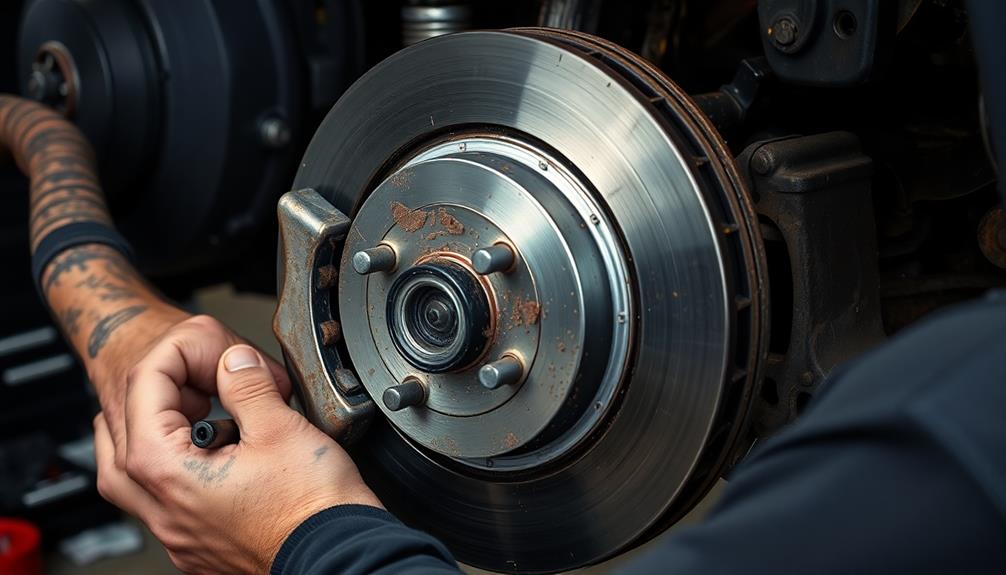
To keep your brakes in top shape, schedule routine inspections every 35,000 to 45,000 miles.
Regularly check your brake fluid levels and look for signs of wear on the pads and rotors.
Staying proactive with these maintenance tasks can save you from costly repairs down the road.
Schedule Routine Inspections
Keeping your brakes in top shape requires regular attention, and scheduling routine inspections is key. Aim for a brake system inspection every 35,000 to 45,000 miles to catch wear before it turns into costly repairs.
During these inspections, you can check the thickness of your brake pads and the condition of the hardware, preventing issues like grinding noises and caliper problems.
Here are a few benefits of scheduling routine inspections:
- Early Problem Detection: Address any unusual noises or vibrations promptly to prevent severe damage.
- Documentation: Keep a maintenance history to track your brake system's condition and make informed service decisions.
- Enhanced Longevity: Regular maintenance and inspections can notably extend the life of your brake system.
Monitor Brake Fluid Levels
Regularly monitoring your brake fluid levels is vital for maintaining ideal braking performance. As part of your monthly brake maintenance routine, check and refill the brake fluid to guarantee it's at the best level. Low brake fluid can indicate a leak or wear in your braking system, which requires immediate attention to prevent safety hazards.
Brake fluid is hygroscopic, meaning it absorbs moisture over time. This moisture can lead to decreased braking effectiveness and corrosion within the braking system. To combat this, replace your brake fluid according to the manufacturer's guidelines, typically every 1-2 years.
Keeping your brake fluid topped off helps maintain consistent hydraulic pressure, which is essential for responsive braking. Routine changes not only enhance your vehicle's braking performance but also contribute to the overall longevity of your brake system.
Neglecting fluid maintenance can result in costly repairs down the line, so don't overlook this important aspect.
Check for Wear Regularly
Although it might be easy to overlook, checking for wear on your brakes regularly is essential to your vehicle's safety and performance.
Regular inspections of your brake pads and rotors can prevent severe damage and guarantee safe stopping distances. Aim to check them every 35,000 to 45,000 miles.
Here's what to keep an eye on:
- Brake pad thickness: Worn pads can lead to caliper issues and compromised braking performance.
- Grinding noises: Listen for any unusual sounds while braking; they could signal severe wear that needs immediate attention.
- Documentation: Keep a record of your maintenance and inspection results to track the condition of your brakes.
Load Management Tips
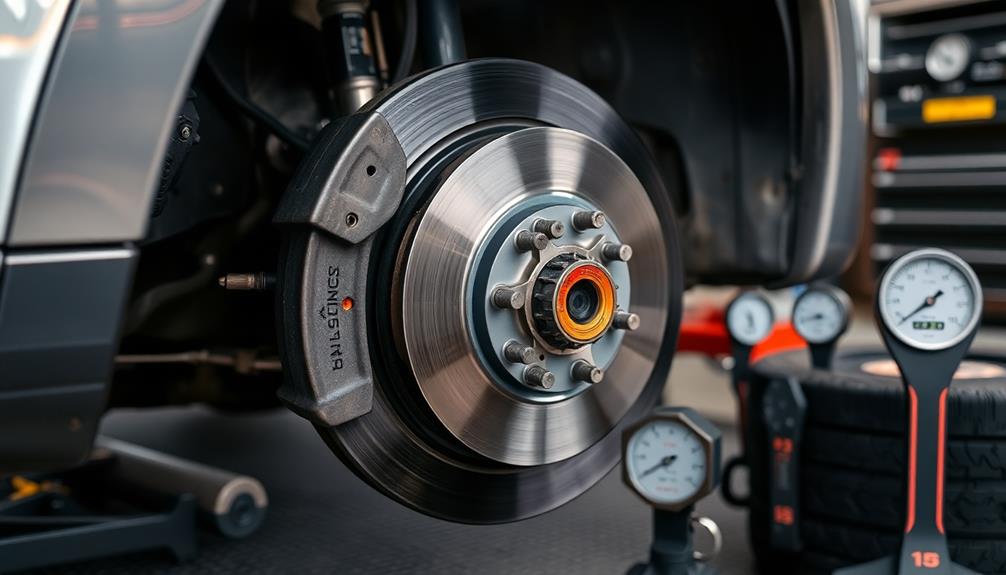
Many drivers underestimate the impact of load management on their vehicle's braking system. By reducing unnecessary weight, you can considerably decrease the strain on your brakes, potentially extending their lifespan by up to 20%.
Overloading your vehicle not only puts extra pressure on your braking components but can also lead to overheating, resulting in premature wear and reduced braking efficiency.
To avoid this, regularly assess and manage your load. Keep cargo to a minimum; this not only enhances fuel efficiency but also leads to lower brake maintenance costs over time.
Distributing weight evenly throughout your vehicle is essential. An unbalanced load can cause uneven brake wear, which can shorten the life of your brake pads and rotors.
Incorporating load management into your driving routine guarantees peak performance, reducing the frequency of brake applications and extending their longevity.
By being mindful of what you carry and how it's distributed, you're taking a simple yet effective step to protect your braking system and improve your vehicle's overall performance.
Quality Components and Upgrades
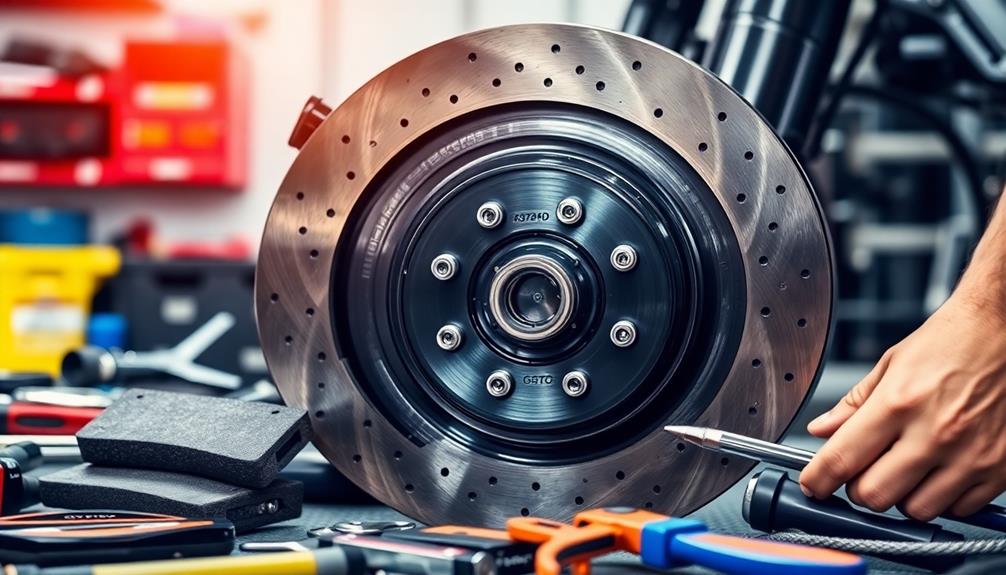
Upgrading to high-quality brake pads can boost their lifespan by up to 50%, making your driving experience smoother and quieter.
Pairing them with premium rotors enhances heat dissipation, which prevents brake fade and improves performance.
Investing in these components not only optimizes your braking system but also saves you money in the long run.
High-Quality Brake Pads
High-quality brake pads are a game changer for your vehicle's braking system. By upgrading to these premium components, you can extend their lifespan by up to 50%, reducing how often you need replacements and saving on maintenance costs.
High-quality brake pads, particularly ceramic ones, not only enhance your overall brake performance but also contribute to a quieter, cleaner driving experience.
Here are some key benefits of investing in high-quality brake pads:
- Less Dust and Noise: Premium pads produce considerably less dust and noise, improving driving comfort.
- Better Heat Dissipation: Quality brake pads help reduce brake fade, especially during high-stress driving conditions.
- Compatibility and Reliability: Using OEM parts guarantees peak brake function and safety.
Additionally, don't forget about brake hardware. Using quality components like clips and calipers is essential for minimizing drag and maximizing braking efficiency.
When you choose high-quality brake pads, you're not just improving your vehicle's performance; you're also investing in safety and longevity, guaranteeing a smoother, more reliable ride for years to come.
Premium Rotor Benefits
When it comes to enhancing your vehicle's braking system, investing in premium rotors can make a significant difference. These rotors are crafted with advanced materials that excel in heat dissipation, ensuring your braking performance remains steady even during heavy use.
If you often tow or navigate mountainous terrain, upgrading to high-quality rotors can vastly improve your overall braking responsiveness and stability. Additionally, for those who tune their Nissan vehicles, performance upgrades can complement the benefits of premium rotors, leading to a more dynamic driving experience.
Premium rotors also feature precision engineering, which minimizes vibration and noise while braking. This contributes to a smoother driving experience, making every stop feel confident and controlled.
Plus, by upgrading to these quality components, you can extend the life of your brake pads. Since premium rotors are designed to wear evenly, they help prevent premature pad wear, saving you money in the long run.
Many premium rotors come with protective coatings that resist corrosion, further extending the lifespan of your braking system.
By investing in premium rotors, you're not just enhancing your vehicle's performance; you're also ensuring that your entire braking system remains reliable and cost-effective.
Make the switch, and you'll notice the difference in both performance and durability.
Recognizing Signs of Wear
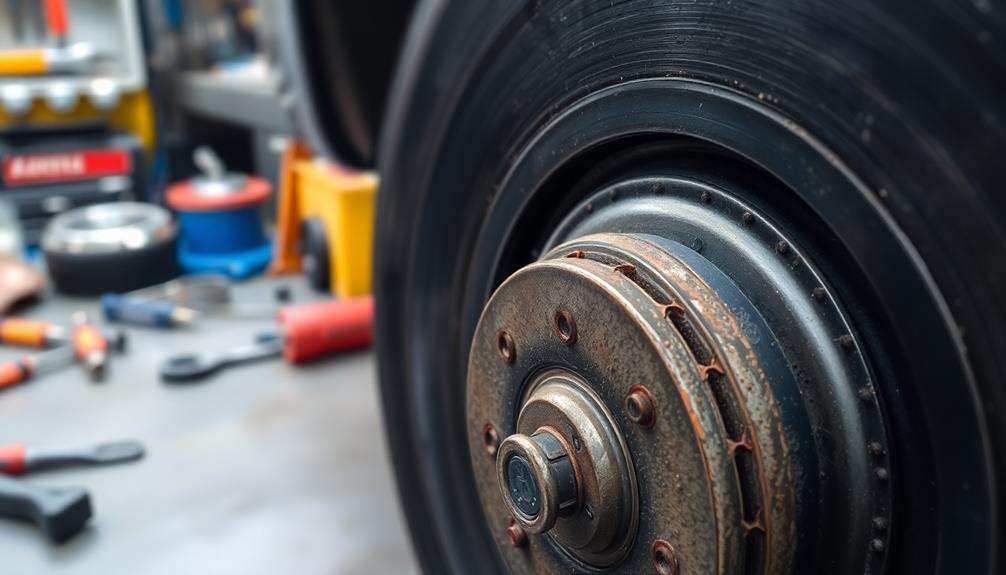
Recognizing the signs of brake wear can save you from costly repairs and guarantee your safety on the road.
It's essential to keep an eye on your vehicle's performance to catch any issues early. Here are some warning signs to watch for:
- Grinding noises: If you hear grinding when braking, your brake pads might be worn down to the metal. This requires immediate attention to prevent damage to the rotors.
- Pulling to one side: If your vehicle pulls to one side during braking, this could indicate uneven wear on the brake pads or issues with the brake calipers.
- Vibrating brake pedal: A pulsating sensation in the brake pedal can signal warped rotors, which affects braking performance and needs prompt inspection.
Additionally, a soft or spongy brake pedal feel may indicate air in the brake lines or low brake fluid levels, both of which compromise safety.
Don't ignore any warning lights on your dashboard related to the brake system; they often signal significant issues that need addressing.
Staying vigilant about these signs can help you avoid wear and tear and keep your brakes functioning effectively.
Seasonal Driving Considerations

As the seasons change, so do the challenges your brakes face. In winter, it's essential to inspect your brakes for ice and snow conditions. These elements can greatly impact braking performance and safety.
Make it a habit to check your brake system frequently during colder months to guarantee everything's in top shape.
When summer rolls around, the heat can lead to brake fade, making regular checks just as important. If you're hitting the road for a summer trip, remember that the increased frequency of braking can accelerate wear.
Proactive maintenance is critical to keep your brakes in good condition for those long journeys.
Adjusting your driving practices based on seasonal conditions can also help preserve brake life. For instance, in slippery conditions, try coasting more to reduce brake use.
On long trips, monitor your brake performance closely. Listen for unusual sounds that might indicate potential problems before they escalate into serious issues.
Importance of Brake Fluid
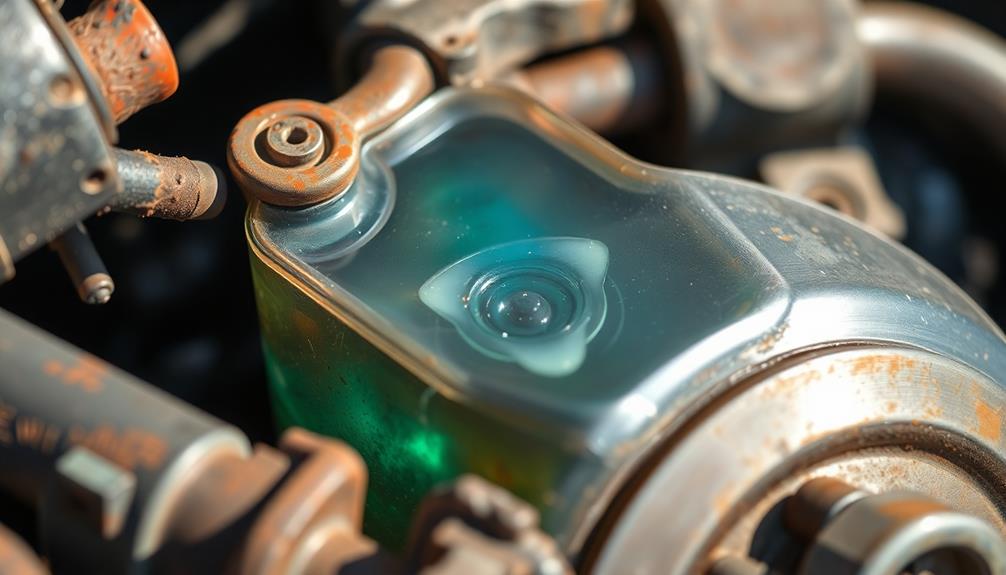
Maintaining proper brake fluid levels is essential for your vehicle's safety and performance. Brake fluid plays a critical role in ensuring your braking system operates effectively. Over time, brake fluid absorbs moisture, which can lead to corrosion and reduced braking performance if not regularly checked and replaced.
Here are a few key reasons to prioritize brake fluid maintenance:
- Prevents spongy pedals: Low brake fluid can cause your brake pedal to feel spongy, compromising your ability to stop effectively.
- Avoids air bubble formation: Contaminated brake fluid can create air bubbles in the lines, making brakes less responsive and increasing stopping distances.
- Prolongs the life of components: Regularly maintaining brake fluid prevents damage from moisture and contaminants, ensuring your brake system lasts longer.
Most manufacturers recommend checking and changing your brake fluid every two years or as specified in your vehicle's owner's manual.
By keeping an eye on your brake fluid, you not only enhance your braking performance but also prolong the life of your brake components.
Don't underestimate the importance of this simple maintenance task!
Cost-Effective Brake Solutions
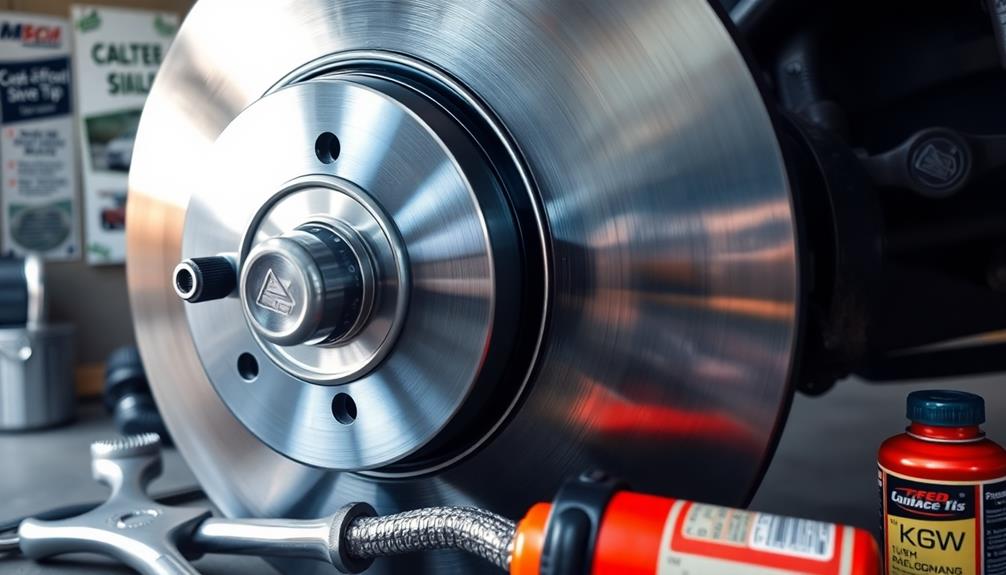
Keeping your brake fluid in check is just one part of guaranteeing your braking system works efficiently. To further enhance performance and save money, consider investing in new brake hardware. Priced at less than $20, this small investment can greatly prolong the life of your brake pads. When you pair new hardware with fresh pads, you're setting yourself up for success.
On the other hand, opting for cheap brake pads while using old hardware is a poor financial decision. This combination can lead to premature wear and tear, forcing you to replace components more frequently, which ultimately costs you more in the long run.
Regular diagnostics and inspections are also essential; they can help you identify minor issues before they escalate into major, costly repairs.
While it may be tempting to go for the cheapest options available, investing in quality brake components will improve your vehicle's performance and reduce maintenance costs over time. Prioritizing your braking system not only enhances safety but also guarantees that you won't face unexpected expenses down the road.
Expert Brake Services Available

When you choose expert brake services, you're investing in your vehicle's safety and performance. These services offer thorough brake inspections that identify wear on brake pads, rotors, and other components, guaranteeing everything runs smoothly.
By regularly scheduling maintenance with trained technicians, you can catch issues before they escalate into costly repairs.
Here are a few benefits of expert brake services:
- High-quality components: Professional services often use premium brake pads and rotors, lasting up to 50% longer than standard options.
- Routine brake fluid checks: Experts help prevent moisture absorption, reducing the risk of corrosion and maintaining braking efficiency.
- Pre-trip inspections: Scheduling brake inspections before long trips guarantees your braking system is in peak condition, enhancing safety on the road.
Investing in expert brake services not only prolongs the life of your brakes but also boosts your overall driving experience.
With regular inspections and maintenance, you can drive with peace of mind, knowing your vehicle is equipped for any journey.
Don't wait for warning signs; take proactive steps to protect your brakes today!
Frequently Asked Questions
How Can I Make My Brakes Last Longer?
To make your brakes last longer, maintain a safe following distance, check and replace brake pads regularly, use engine braking on slopes, accelerate and decelerate smoothly, and avoid carrying excess weight in your vehicle.
How to Increase the Life of Brake Pads?
Choosing high-quality brake pads can extend their lifespan by up to 50%. To increase brake pad life, drive smoothly, avoid sudden stops, and regularly check your brake fluid to maintain peak performance and prevent corrosion.
How to Make Pads Last Longer?
To make your brake pads last longer, gradually apply pressure, maintain a safe distance to avoid sudden stops, use engine braking on hills, and regularly inspect and replace worn pads with high-quality options.
How to Drive to Preserve Brakes?
Did you know smooth driving can extend brake life by 30%? To preserve your brakes, maintain a safe distance, coast before stops, use engine braking on hills, and regularly check your brake fluid levels.
Conclusion
So, if you think slamming on your brakes is the secret to making them last longer, think again! Embracing smooth driving, regular maintenance, and proper load management will actually keep your brakes happy and healthy. Who knew that treating your brakes gently would save you money and hassle in the long run? Just like a delicate flower, your brakes thrive on care—so give them some love, and they'll reward you with longevity, not a dramatic halt!

